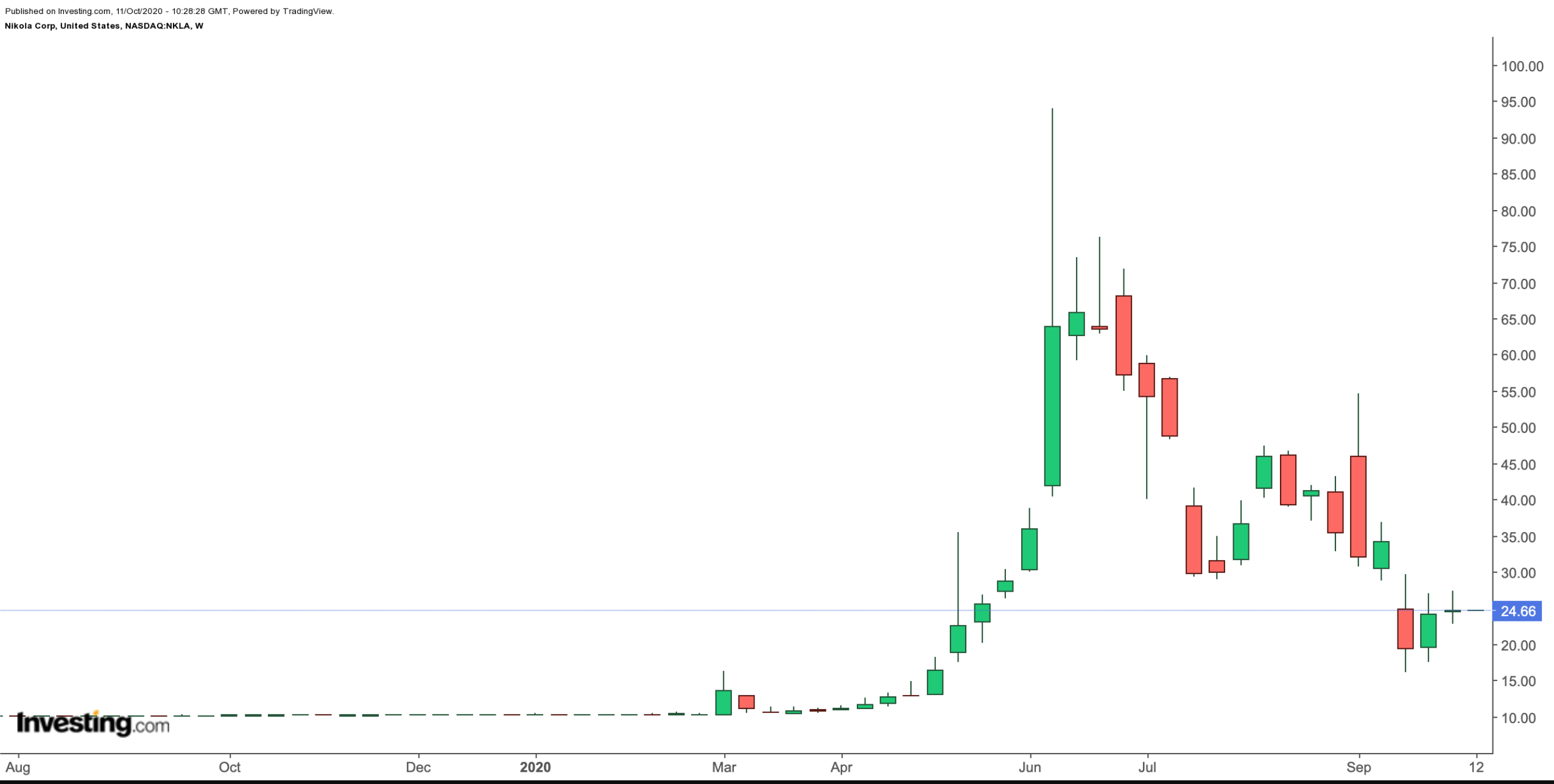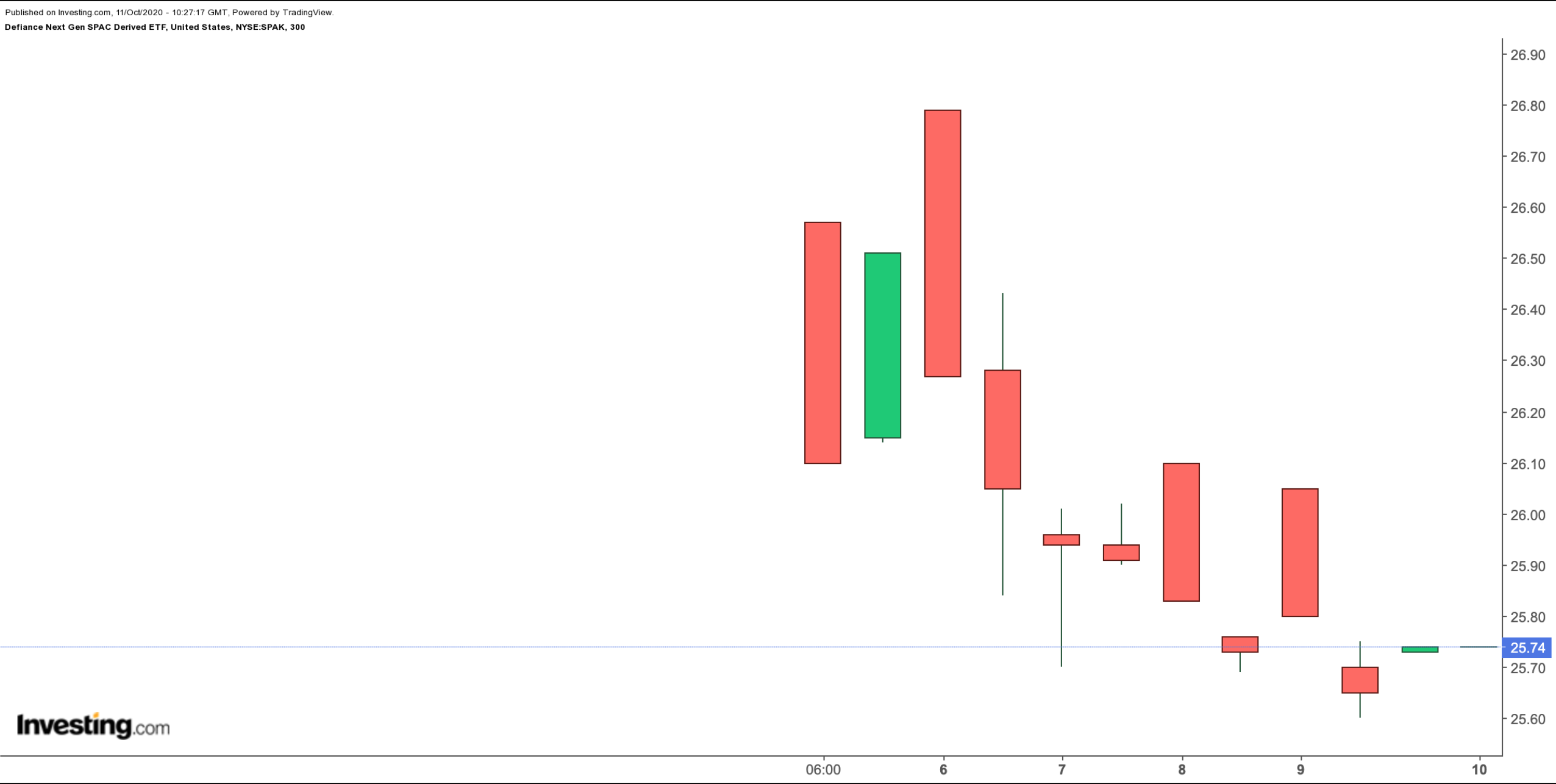On Oct. 1 a new, thematic exchange-traded fund (ETF) was launched, with a focus on special purpose acquisition companies (SPACs)—a trend that's become Wall Street's most recent darling.
The fund, the Defiance Next Gen SPAC Derived ETF (NYSE:SPAK) opened at $25.74 and hit an intraday high of $27.05 in a matter of days. On Oct. 9, shares closed back at $25.74. Why are SPACs getting so much attention? And what might investors expect from this new fund?
What's A SPAC?
Although going public via an initial public offering (IPO) remains one of the most commons routes to obtain financing via the sale of corporate shares, it is not the only way private companies can go public. In 2020 there has been a wave of companies announcing reverse merger deals with SPACs that are already listed on a stock exchange.
SPACs are blank check companies that don't actually have any operations. The US Securities and Exchange Commission (SEC) defines a SPAC as an investment vehicle "created specifically to pool funds in order to finance a merger or acquisition opportunity within a set timeframe. The opportunity usually has yet to be identified."
Put another way, a SPAC conducts an IPO to use the proceeds to finalize a future deal with a private company that prefers to become public via a reverse merger, instead of a traditional IPO. Management usually has a two-year time frame to identify an acquisition opportunity that could be approved by shareholders. SPACs are set up with different objectives and industry concentrations.
Investing.com readers following the SPAC space would have noticed that SPACs initially trade between $8 and $10, though some start higher. When a given SPAC announces a potential candidate for a reverse merger, the share price generally starts going up. The run-up in price may even begin a few days before the announcement when the rumor mill hits the wires.
Following the reverse merger announcement, the SPAC share price often hits a new high in a matter of days, followed by increased volatility. In the aftermath of the completion of the merger—generally in a matter of months—the combined entity's fate and its stock price will depend on a range of factors, much like the shares of companies that went public via a conventional IPO.
SPACs Hot Right Now
Though 2020 will surely be remembered for pandemic-related market volatility, it's also possible investors will flash back to the number of SPACs that have acquired private companies to take them public. Many public names and well-know investment managers have also become part of the industry.
Some of the names making headlines in recent weeks include full-service home medical equipment firm AdaptHealth (NASDAQ:AHCO), Diamondpeak (NASDAQ:DPHC), which is a newcomer to the electric vehicle (EV) space, digital sports entertainment and gaming company DraftKings (NASDAQ:DKNG). Other examples include Kensington Capital (NYSE:KCAC), which focuses on renewable energy and batteries, producer of electrified powertrain systems Hyliion Holdings (NYSE:HYLN) and clinical-stage biopharmaceutical company Immunovant (NASDAQ:IMVT).
Perhaps the recent SPAC currently garnerning the bulk of the headlines is electric truck manufacturer Nikola (NASDAQ:NKLA), now under SEC investigation, after allegations surfaced that its founder and chairman, "had deceived investors about the company’s technology." Not surprisingly, shares of NKLA, which closed at $24.66 are now down more than 70% from highs reached earlier this year.

Analysts concur that one trend fueling the recent growth in SPACs is investor interest in the EV and alternative energy space, made clear by the fact that a number of these reverse mergers concentrate on some aspect of that industry. Switchback Energy Acquisition (NYSE:SBE), which in late September announced a merger with the privately held electric vehicle charging network ChargePoint, and space exploration company Virgin Galactic Holdings (NYSE:SPCE) comes to mind. Indeed, over the past year, investors have been looking for the next Tesla (NASDAQ:TSLA), an early moved in the EV space which is up around 418% year-to-date.
Still, the general long-term success of SPACs is a matter of continuous debate and academic study. For example, research by Johannes Kolb and Tereza Tykvová of the University of Hohenheim, Germany, note:
"SPAC firms are associated with severe underperformance in comparison to the market, the industry and (comparable) IPO firms."
As well, many recently-merged companies go below $10-level and do not create much value, especially for retail investors. Firms whose share prices are now well below $10 include American Virtual Cloud Technologies (NASDAQ:AVCT), Daseke (NASDAQ:DSKE), Playa Hotels & Resorts (NASDAQ:PLYA), Rimini Street (NASDAQ:RMNI), and Waitr Holdings (NASDAQ:WTRH).
With that information, here's a look at the recently-launched SPAC ETF.
Defiance Next Gen SPAC Derived ETF
- Current Price: $25.74
- 52-Week Range: $25.32 - $27.05
- Expense Ratio: 0.45%
The Defiance Next Gen SPAC Derived ETF has 36 holdings. It tracks the Indxx SPAC & NextGen IPO index, which provides exposure to newly listed SPACs, ex-warrants, and IPOs of the preceding 36 months. The fund will be rebalanced quarterly.
The top ten names make up about 65% of net assets, which are close to $20 million. DraftKings, analytics company Clarivate (NYSE:CCC), Vertiv Holdings (NYSE:VRT), which provides equipment and services for data centers, top the list of holdings. Potential investors should note most of the stocks have already finalized the reverse merger with a SPAC (i.e., around 80% of the holdings).

Since the fund just started trading at the beginning of October, it's too early to discuss its track record. However, given the volatility in the SPAC space as well as broader markets, the next several weeks may bring choppiness to the fund. Investors who would like access to SPACs might put the SPAK ETF on their radar and could consider buying the dips.
Bottom Line
The SPAC craze will possibly continue in the coming months. However, it is important to emphasize again that not all SPACs are successful in the long-run. Although there are clear short-term trading opportunities in this space, due diligence is crucial for identifying potential long-term winners. Company management teams as well as industry dynamics will possibly play important roles for the future of any new deal.
Those who are interested in the SPAC narrative, and are happy to buy-and-hold for several years, or simply wait on the sidelines to see how the fund plays out, could find SPAK appropriate for their portfolio.
